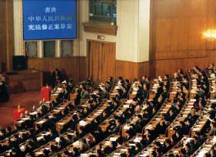|
|
|
POLITICAL
SYSTEM & STATE STRUCTURE
|
|
Constitution
China has drafted four constitutions since the founding of the
People’s Republic, respectively in 1954, 1975, 1978 and 1982.
The present constitution, drawn up after discussion attended by
representatives of all of China’s people, came into effect following
approval by the Fifth Session of the Fifth NPC on December 4,
1982. This constitution continues the basic principles underlying
the first constitution of 1954, while effectively distilling the
experiences gained in China’s socialist development and adopting
the relevant experiences of other nations, all
with
careful consideration of the then realities and the prospects
for further development. As a result, it is a constitution with
Chinese characteristics, well suited for the betterment of the
nation
|

Deputies
to the Second Session of the Ninth NPC held in March 1999 voting
on the draft of an amendment to the Constitution.
|
|
politically, economically and culturally during the new era of
socialist modernization. The Constitution is divided, in addition
to the preamble, into four chapters: General Principles; Fundamental
Rights and Duties of Citizens; the Structure of the State; and
the National Flag, National Emblem and Capital. These, in turn,
contain 138 articles. The First Session of the Seventh NPC, held
in April 1988, the First Session of the Eighth NPC, held in March
1993, and the Second Session of the Ninth NPC, held in March 1999
approved revised versions of the Constitution, and revised and
replenished a small number of articles so as to make them conform
better to the country’s reality and the needs of its development.
The Constitution specifies: The People’s Republic of China is
a socialist state under the people’s democratic dictatorship led
by the working class and based on the alliance of workers and
peasants. China will remain in the primary stage of socialism
for a long time to come. The fundamental task of the state is
to concentrate efforts on socialist modernization along the road
of building socialism with Chinese characteristics. Under the
leadership of the CPC and the guidance of Marxism-Leninism, Mao
Zedong Thought and Deng Xiaoping Theory, the Chinese people of
all ethnic groups will continue to adhere to the people’s democratic
dictatorship and the socialist road, and to uphold reform and
opening to the outside world, steadily improve socialist institutions,
develop the socialist market economy, promote socialist democracy,
improve the socialist legal system, and work hard and in a
self-reliant way to modernize the country’s industry, agriculture,
national defense and science and technology step by step, to build
China into a strong and prosperous, culturally advanced, democratic
socialist nation.
The Constitution guarantees the fundamental rights of every citizen,
including the right to vote and stand for election, the freedoms
of speech, of the press, of assembly, of association, of demonstration
and of religious belief. Citizens’ freedom of the person is inviolable,
as is their right to protection from unwarranted intrusions into
their personal dignity and the sanctity of their homes. Freedom
and privacy of correspondence are protected by law. Citizens have
the right to criticize or make suggestions to any state organ
or functionary, and the right to supervise them. Citizens have
the right to work and to rest, and to material assistance from
the state and society if they are aged, ill or disabled. Citizens
have the right to education and the freedom to engage in scientific
research, literary and artistic creation, and other cultural pursuits.
In addition, the Constitution includes the specifications on the
democratic administration of grass-roots units and the masses’
autonomy, so as to enable the people to directly manage economic
and cultural institutions, and social affairs. For instance, state-owned
enterprises and collective economic organizations practice democratic
management through general meetings or congresses of workers and
staff. Neighborhood committees in cities and villagers* committees
in rural areas practice autonomy by the masses, handle public
affairs and public welfare undertakings of their respective residential
areas, report the opinions and demands of the masses to the government
and put forward proposals.
The Constitution
is the fundamental law of the state, with the highest legal effect.
The people of all ethnic groups in China, all state organs, armed
forces, political parties, social organizations, enterprises and
institutions must observe it as the legal framework of their activities.
|
|



